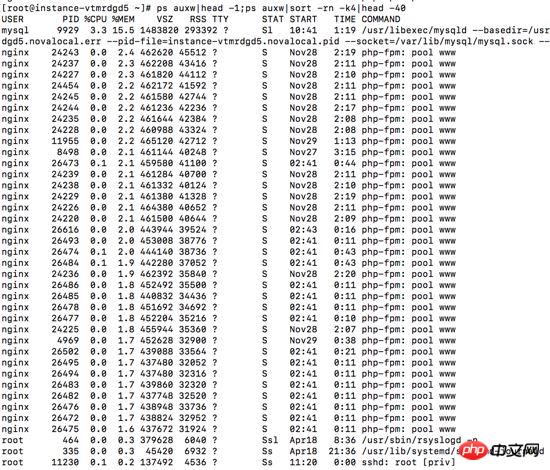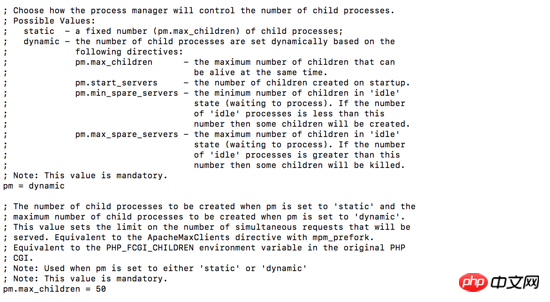 Backend Development
Backend Development
 PHP Tutorial
PHP Tutorial
 Detailed explanation of solving the problem of memory exhaustion caused by too many php-fpm processes under Linux
Detailed explanation of solving the problem of memory exhaustion caused by too many php-fpm processes under Linux
Detailed explanation of solving the problem of memory exhaustion caused by too many php-fpm processes under Linux
This article mainly introduces how to solve the problem of memory exhaustion caused by too many php-fpm processes under Linux. Friends who need it can refer to it
Recently, I found that the Linux server and database service of my personal blog often hang up. , which resulted in the need to restart before I could access it normally, which was extremely disgusting, so I decided to start solving the problem and free up my time and energy (I didn’t want to have problems frequently and then restart manually, which was laborious and time-consuming).
Analyze the problem
After discovering the problem, first use the free -m command to check the current server execution status:

You can see that my server memory is 2G, but currently there is only 70M of available memory left, and the memory usage is as high as 92%. It is very likely that the memory usage is too high. The database service hangs up.
Continue to see the details, use the top command:

Then look at the process details listed in the command output, Focus on the memory usage ratio in column 10:

It is found that the CPU usage is not high, and the CPU problem is also ruled out. In addition, you can see that the database service takes up 15.2%. Memory, when the memory usage is too high, it will crowd out the database process (the process that takes up the most memory), causing the service to hang up, so we need to check the detailed memory usage. Which processes consume so much memory?
Use command:
ps auxw|head -1;ps auxw|sort -rn -k4|head -40
View the top 40 processes that consume the most memory:

Looking at the memory usage ratio in the fourth column, we found that in addition to the mysql database service, the php-fpm service pool opened too many sub-processes, occupying more than half of the memory. The problem was found, and we started to solve the problem: setting control php- Number of fpm process pool processes.
Solve the problem
Through various search methods, I found that you can control php- by configuring the pm.max_children attribute. Number of fpm child processes. First, open the php-fpm configuration file and execute the command:
vi /etc/php-fpm.d/www.conf
Find the pm.max_children field and discover its The value is too large:

As shown in the figure, the value of pm.max_children is 50. Each process occupies 1%-2.5% of the memory, which adds up to It consumes most of the memory, so we need to reduce its value. The blogger here sets it to 25. At the same time, check the following two attributes:
pm.max_spare_servers: This value means Guarantee the maximum number of idle processes. If the idle processes are greater than this value, clean them up pm.min_spare_servers: Guarantee the minimum number of idle processes. If the idle processes are less than this value, create a new child process;
Neither of these two values can be greater than the pm.max_children value. Usually, the pm.max_spare_servers value is set to 60% of the pm.max_children value - 80%.
Finally, restart php-fpm
systemctl restart php-fpm
Check the memory usage again, the memory usage is reduced a lot:

After observing the memory usage many times, we found that after this improvement, the server memory resource consumption has been greatly alleviated.
ps: Check the number of processes started by php-fpm and the memory limit of each process
1. Use the command to check the total number of processes opened on the server. How many php-cgi processes are there
ps -fe |grep "php-fpm"|grep "pool"|wc -l
2. Check how many php-cgi processes are used to handle tcp requests
netstat -anp|grep "php-fpm"|grep "tcp"|grep "pool"|wc -l
3.In the linux nginx php environment, the memory limit of each php-fpm process
Setting method:
Edit the php-fpm.conf configuration file
php_admin_value[memory_limit] = 128M (the configuration file on my server is in /etc/php5/fpm/pool.d/www.conf This file is included in php-fpm.conf) The following numbers can be changed at will: 32M, 64M, 128M, 256M, 512M. This setting can be written according to your server memory size and your needs. After modification, Load the php-fpm service.
Summary
The above is the solution to the problem of memory exhaustion caused by too many php-fpm processes under Linux introduced by the editor. I hope it is helpful to you. If you have any questions, please leave me a message and I will reply to you in time. I would also like to thank you all for your support of the php Chinese website!
Articles you may be interested in:
Detailed analysis of examples of methods for php to implement the check-in function
Detailed explanation of data migration and data filling in Laravel
The above is the detailed content of Detailed explanation of solving the problem of memory exhaustion caused by too many php-fpm processes under Linux. For more information, please follow other related articles on the PHP Chinese website!

Hot AI Tools

Undresser.AI Undress
AI-powered app for creating realistic nude photos

AI Clothes Remover
Online AI tool for removing clothes from photos.

Undress AI Tool
Undress images for free

Clothoff.io
AI clothes remover

AI Hentai Generator
Generate AI Hentai for free.

Hot Article

Hot Tools

Notepad++7.3.1
Easy-to-use and free code editor

SublimeText3 Chinese version
Chinese version, very easy to use

Zend Studio 13.0.1
Powerful PHP integrated development environment

Dreamweaver CS6
Visual web development tools

SublimeText3 Mac version
God-level code editing software (SublimeText3)

Hot Topics
 1377
1377
 52
52
 The Future of PHP: Adaptations and Innovations
Apr 11, 2025 am 12:01 AM
The Future of PHP: Adaptations and Innovations
Apr 11, 2025 am 12:01 AM
The future of PHP will be achieved by adapting to new technology trends and introducing innovative features: 1) Adapting to cloud computing, containerization and microservice architectures, supporting Docker and Kubernetes; 2) introducing JIT compilers and enumeration types to improve performance and data processing efficiency; 3) Continuously optimize performance and promote best practices.
 PHP vs. Python: Understanding the Differences
Apr 11, 2025 am 12:15 AM
PHP vs. Python: Understanding the Differences
Apr 11, 2025 am 12:15 AM
PHP and Python each have their own advantages, and the choice should be based on project requirements. 1.PHP is suitable for web development, with simple syntax and high execution efficiency. 2. Python is suitable for data science and machine learning, with concise syntax and rich libraries.
 CentOS Interview Questions: Ace Your Linux System Administrator Interview
Apr 09, 2025 am 12:17 AM
CentOS Interview Questions: Ace Your Linux System Administrator Interview
Apr 09, 2025 am 12:17 AM
Frequently asked questions and answers to CentOS interview include: 1. Use the yum or dnf command to install software packages, such as sudoyumininstallnginx. 2. Manage users and groups through useradd and groupadd commands, such as sudouseradd-m-s/bin/bashnewuser. 3. Use firewalld to configure the firewall, such as sudofirewall-cmd--permanent-add-service=http. 4. Set automatic updates to use yum-cron, such as sudoyumininstallyum-cron and configure apply_updates=yes.
 How to learn Linux basics?
Apr 10, 2025 am 09:32 AM
How to learn Linux basics?
Apr 10, 2025 am 09:32 AM
The methods for basic Linux learning from scratch include: 1. Understand the file system and command line interface, 2. Master basic commands such as ls, cd, mkdir, 3. Learn file operations, such as creating and editing files, 4. Explore advanced usage such as pipelines and grep commands, 5. Master debugging skills and performance optimization, 6. Continuously improve skills through practice and exploration.
 PHP: Is It Dying or Simply Adapting?
Apr 11, 2025 am 12:13 AM
PHP: Is It Dying or Simply Adapting?
Apr 11, 2025 am 12:13 AM
PHP is not dying, but constantly adapting and evolving. 1) PHP has undergone multiple version iterations since 1994 to adapt to new technology trends. 2) It is currently widely used in e-commerce, content management systems and other fields. 3) PHP8 introduces JIT compiler and other functions to improve performance and modernization. 4) Use OPcache and follow PSR-12 standards to optimize performance and code quality.
 Key Linux Operations: A Beginner's Guide
Apr 09, 2025 pm 04:09 PM
Key Linux Operations: A Beginner's Guide
Apr 09, 2025 pm 04:09 PM
Linux beginners should master basic operations such as file management, user management and network configuration. 1) File management: Use mkdir, touch, ls, rm, mv, and CP commands. 2) User management: Use useradd, passwd, userdel, and usermod commands. 3) Network configuration: Use ifconfig, echo, and ufw commands. These operations are the basis of Linux system management, and mastering them can effectively manage the system.
 How to start the server with redis
Apr 10, 2025 pm 08:12 PM
How to start the server with redis
Apr 10, 2025 pm 08:12 PM
The steps to start a Redis server include: Install Redis according to the operating system. Start the Redis service via redis-server (Linux/macOS) or redis-server.exe (Windows). Use the redis-cli ping (Linux/macOS) or redis-cli.exe ping (Windows) command to check the service status. Use a Redis client, such as redis-cli, Python, or Node.js, to access the server.
 H5: Tools, Frameworks, and Best Practices
Apr 11, 2025 am 12:11 AM
H5: Tools, Frameworks, and Best Practices
Apr 11, 2025 am 12:11 AM
The tools and frameworks that need to be mastered in H5 development include Vue.js, React and Webpack. 1.Vue.js is suitable for building user interfaces and supports component development. 2.React optimizes page rendering through virtual DOM, suitable for complex applications. 3.Webpack is used for module packaging and optimize resource loading.



